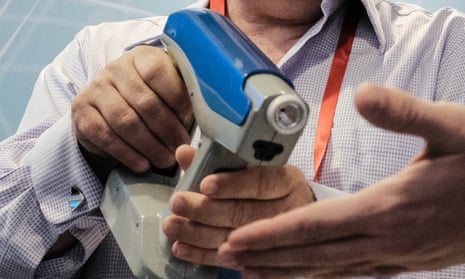Doctors in Europe and Israel have begun using a medical gun that spins out a protective web to cover burns and wounds, hoping the breathable “skin substitute” will help patients recover without the need for painful bandage changes.
Nanomedic, the Israeli company that designed the Spincare system, claims its device gives patients increased mobility – often essential for burn rehabilitation – and the ability to shower, a process that can be difficult with traditional bandages. The translucent layer it produces allows medics to examine the wound without touching it, the firm says.
Rob Lyon, the managing director of the UK-based distributor for Spincare, said burns could be extremely difficult to dress, making the application of bandages agonising.
“Spincare is a contactless device,” said Lyon, whose company, Regen Medical, specialises in burns and wound healing products. The protective mesh, Lyon said, “mimics the skin”, which allows patients to move around more easily.
Electrospinning, the technique the device employs, involves using electricity to create nano-fibres from a solution, and has been in use for years, including in the medical field. Nanomedic says its device, however, is much smaller than the large electrospinning machines previously available, meaning it can be carried to a patient’s bedside.
Gary J Sagiv, the company’s vice-president for marketing and sales, said hospitals in Germany and Switzerland had used the product for facial wounds, where large bandages could be burdensome. Others, he said, had applied it to wounds on people with diabetes, who can develop chronic foot sores that can lead to amputation.
Unwilling to provide a price, which he said differed depending on which country it was sold in, Sagiv claimed Spincare was cost-effective for hospitals compared with other advanced wound care bandages.
Baljit Dheansa, a doctor in the UK who specialises in burns and scarring, said he had used Spincare on five patients at Queen Victoria hospital in Sussex, with positive results on superficial burns. “You have this fine whitish thing on that’s fairly robust and seems to cope with most things,” he said.
With deep burns, it was less effective, he said, but clarified that Nanomedic had not claimed Spincare would be useful for deep burns.
Dheansa said the product arrived at a time of debate within the medical community on whether the traditional approach of regularly changing bandages to assess wounds was counterproductive. Several specialist bandages already being used by doctors do not need to be changed often.
“Spincare is the same sort of concept – the idea of protecting a wound and letting nature do what it will do,” he said. “Although it’s not absolutely novel in the sense that it’s a stick-on dressing that stays stuck, it’s novel way of applying it. And in some respects, it’s probably a little bit easier.”
“You get your laser-guided weapon system … you just spin,” he joked, referring to the laser pointer on the tip of the medical gun to help the user aim.
Queen Victoria hospital has agreed to buy more single-use capsules for the product, according to Dheansa, and he hopes to produce research on its effectiveness.
“What we try as much as we can is to take a fairly independent view of these things. Although a company will say it does this and does this and does this, we’ve come in fairly innocently and independently and said, you say this but let’s actually see what it does.”
So far, Dheansa said, Spincare “does what it says on the tin”.
“With this kind of dressing, in the right circumstance, it just means the patient doesn’t have to learn about how to do dressings, and they are bit more flexible and don’t have to worry so much. And sort of relax a bit more.”
